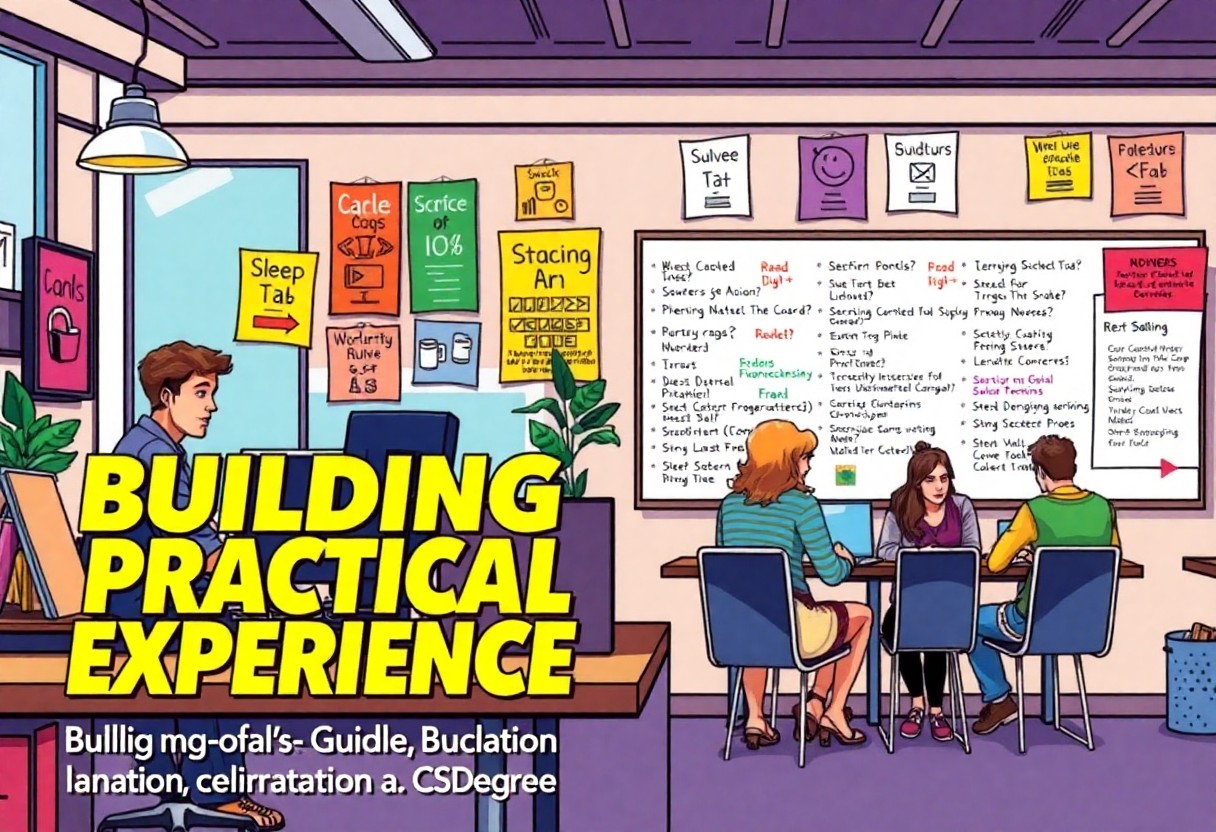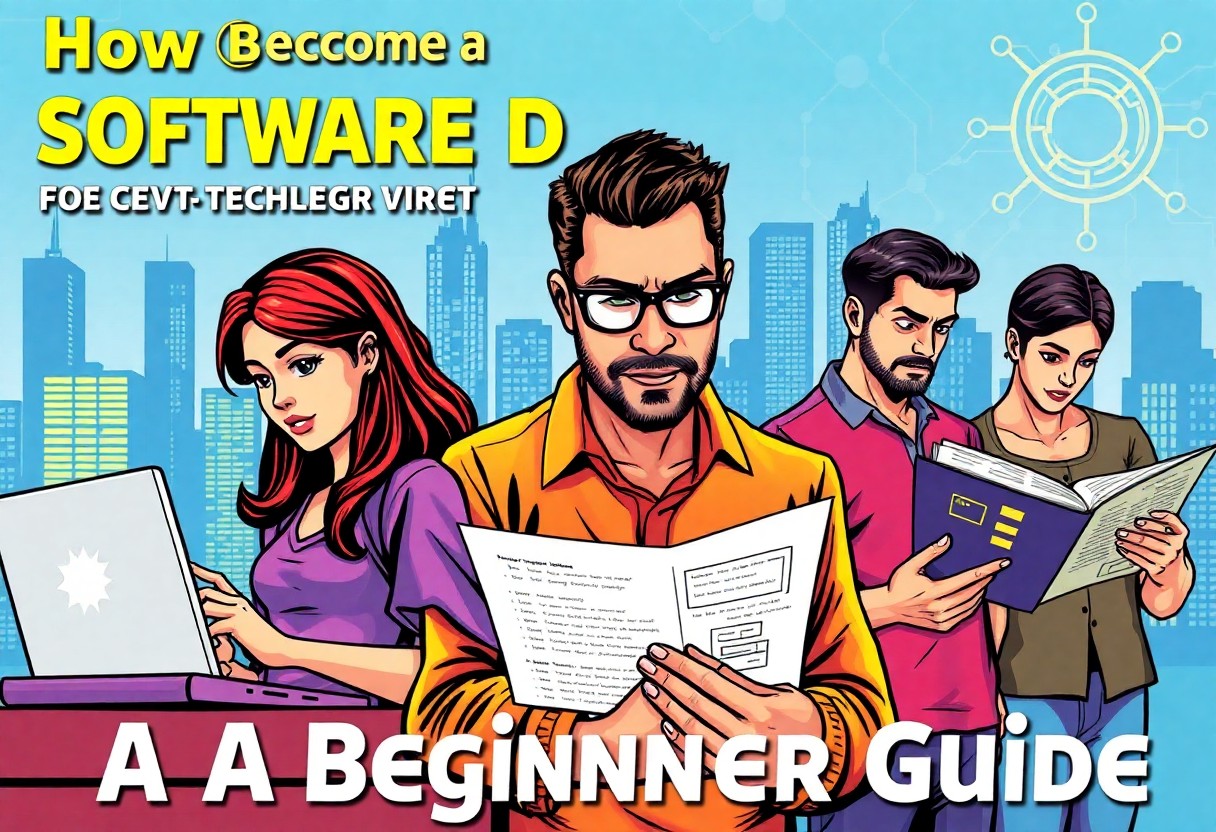Many aspiring software developers believe that a Computer Science degree is a necessity for success in the tech industry. However, I’m here to show you that it’s possible to launch your career without formal education. By focusing on self-directed learning, leveraging online resources, and building a strong portfolio, you can gain the skills and experience employers are looking for. In this guide, I will outline the steps you need to take to transition into software development and achieve your goals.
Key Takeaways:
- Focus on building practical skills through online courses, coding bootcamps, or self-study projects.
- Create a portfolio showcasing your projects to demonstrate your abilities to potential employers.
- Engage with the developer community through networking, forums, and open-source contributions to enhance learning and job opportunities.
Understanding the Software Development Field
Delving into the software development field reveals a dynamic landscape characterized by rapid technological advancement and diverse career pathways. With roles that span from front-end development to data engineering, professionals in this domain contribute to projects that impact everyday technology. The demand for skilled developers continues to grow, making it an opportune moment to explore the variety of roles available and the important skills needed to thrive.
Overview of Software Development Roles
The software development arena encompasses numerous roles, each specializing in distinct aspects of the development lifecycle. From front-end developers who craft user interfaces to back-end developers responsible for server-side logic, the variety of positions allows you to find your niche. Other roles include full-stack developers, who manage both front-end and back-end tasks, and devops engineers, focusing on deployment and operations. Exploring these options can help pinpoint where your interests and strengths align.
Key Skills Required for Success
To excel in software development, you must cultivate a mix of technical and soft skills. Proficiency in programming languages like JavaScript or Python is non-negotiable. Understanding version control systems, especially Git, is vital for collaboration. Additionally, critical problem-solving skills enable you to tackle complex challenges effectively. Lastly, honing communication skills supports teamwork and facilitates conveying ideas clearly.
Technical skills form the backbone of your development journey. Mastery of programming languages, such as JavaScript, Python, or Ruby, is important not just for creating software but for efficiently debugging and optimizing code. Knowledge of frameworks like React or Angular can set you apart. Simulation exercises and coding challenges strengthen your problem-solving abilities, allowing you to approach real-world issues creatively. Don’t overlook collaboration tools like Git for version control; they enhance team collaboration. Alongside these skills, fostering strong communication helps you articulate your thoughts, making you a valuable team player who can bridge technical and non-technical discussions effectively.
Choosing Your Learning Path
Finding the right learning path is vital to your success as a software developer. You can explore different options, including how to become a Software Engineer without a CS degree? Tailoring your approach based on your goals, time availability, and preferred learning style will help you stay motivated and develop your skills efficiently.
Self-Study vs. Formal Education
Self-study offers flexibility and autonomy, allowing you to progress at your own pace, while formal education can provide structured learning and networking opportunities. Many successful developers have thrived through self-directed projects and online resources, gaining skills relevant to the industry without traditional degrees.
Online Resources and Courses
The internet hosts numerous platforms for learning coding, from websites like Codecademy and freeCodeCamp to MOOCs like Coursera and edX. Engaging with interactive tutorials, coding challenges, and project-based courses prepares you for real-world applications, paving the way for a solid tech foundation.
Online resources and courses often include a mix of videos, quizzes, and hands-on projects, enabling you to learn at your own pace. Platforms like Udacity and Pluralsight even offer nanodegrees and specializations in specific areas of software development, equipping you with targeted skills. Additionally, participating in developer communities, such as GitHub or Stack Overflow, can enhance your learning experience through collaboration and feedback. You can leverage these opportunities to network with professionals, gain insights into industry trends, and showcase your portfolio effectively.

Building Practical Experience
Practical experience is where theory meets real-world application, and it’s fundamental in becoming a successful software developer. Engaging with hands-on projects not only solidifies your learning but also equips you with the skills employers seek. By immersing yourself in building applications or tackling real-world challenges, you’ll gain invaluable insights and boost your confidence in coding.
Personal Projects and Portfolio Development
Creating personal projects is a powerful way to demonstrate your skills and creativity. Choose projects that inspire you, whether it’s a web application, mobile app, or game. Documenting these projects on platforms like GitHub enables you to showcase your work effectively. An impressive portfolio becomes your calling card in the job market, reflecting your capabilities and thought processes.
Contributing to Open Source
Contributing to open-source projects allows you to work alongside experienced developers and gain real-world experience. I found that participating in these communities not only sharpened my skills but also expanded my professional network. Many platforms, like GitHub, host projects in need of contributors, and tackling issues or adding features can significantly enhance your learning.
Open-source contributions often lead to valuable connections within the tech community. You’ll encounter established developers willing to mentor you, which can be immensely helpful. Moreover, your contributions gain visibility; for instance, projects like Mozilla and TensorFlow rely heavily on community input, and successfully contributing can lead to job opportunities. As you navigate through issues on platforms like GitHub, you’ll learn to communicate effectively, understand code reviews, and apply industry standards that are critical in any development role.
Networking and Community Engagement
Engaging with the tech community can significantly accelerate your journey to becoming a software developer without a CS degree. Building connections with industry professionals opens doors to job opportunities, mentorship, and valuable insights. Active participation in various networking avenues will strengthen your understanding of the field and help you stay updated on industry trends.
Leveraging Social Media and Online Forums
Social media platforms like LinkedIn and Twitter, along with online forums such as Reddit and Stack Overflow, offer excellent opportunities for connecting with other developers and tech enthusiasts. Participate in discussions, share your projects, and seek feedback to enhance your visibility. Engaging with community posts can lead to new friendships and professional opportunities, creating a supportive network around your learning journey.
Attending Meetups and Networking Events
Local meetups and tech networking events serve as fantastic venues for direct interaction with other professionals. I’ve found that these gatherings often feature guest speakers and hands-on workshops, which can provide deeper insights into specific technologies. Connecting with others in informal settings allows for more genuine conversations about experiences, challenges, and opportunities in the software development field.
Some of the best experiences I’ve had occurred at local coding meetups where I met developers facing similar challenges. Attendees frequently share job leads, insights on current technologies, and recommendations for resources. Many cities host regular events through platforms like Meetup and Eventbrite, featuring tech talks, hackathons, and hands-on workshops. Frequenting these events not only expands your network but also solidifies your presence in the community, increasing your chances of landing mentorship or job opportunities down the line.
Tips for Landing Your First Job
Landing your first software development job can be a challenge, but with the right approach, you can increase your chances significantly. Focus on building a solid portfolio, gaining relevant experience, and networking with industry professionals. Here are some key strategies:
- Develop a portfolio showcasing your projects.
- Leverage networking opportunities within tech communities.
- Create a tailored resume that highlights your skills.
- Prepare for interviews by practicing coding challenges.
Recognizing the importance of these elements can set you apart from other candidates.
Crafting a Standout Resume
Your resume should clearly demonstrate your skills and projects, making it easy for employers to see your potential. Focus on relevant technologies and include links to your GitHub or personal projects. Tailoring your resume for each job application improves your visibility to hiring managers, so ensure you highlight your experience and achievements pertinent to the role you seek.
Preparing for Technical Interviews
Approach technical interviews with a focus on practicing coding problems and understanding algorithms. Familiarize yourself with common coding interview questions and work through them regularly to develop your problem-solving skills. Additionally, enhancing your knowledge of data structures and the fundamentals of programming languages can significantly increase your confidence.
During technical interviews, be ready to explain your thought process as you tackle problems. Engaging in mock interviews can be especially beneficial; platforms like HackerRank or LeetCode offer a variety of challenges that prepare you for real scenarios. Timing yourself while solving these problems can also help you manage your pace during interviews. Make sure to ask clarifying questions and communicate effectively with your interviewer, showcasing your problem-solving strategies and adaptability. This thorough preparation can help you stand out as a capable candidate ready to enter the software development field.
Continuing Your Development Journey
Becoming a software developer is just the beginning. As technology evolves, so must your skills and knowledge. Continuous learning and adaptation are key to sustaining growth in your career. With various resources available—from online courses to webinars—you can consistently enhance your expertise, stay relevant, and even explore new areas of interest. Your journey doesn’t have to come to a halt; it should be a lifelong pursuit of knowledge.
Staying Updated with Industry Trends
Staying informed about the latest trends in technology allows you to maintain a competitive edge. I subscribe to industry newsletters, follow influential thought leaders on social media, and engage with tech blogs that dissect emerging technologies. Participating in conferences and meetups can provide insights on current practices and innovations, ensuring you’re well-versed in the shifts shaping our industry.
Fostering Continuous Learning
Fostering continuous learning enriches both your skill set and career progression. Consider setting aside regular time each week for focused learning—whether through online courses or coding challenges. Platforms like Coursera and Udemy offer courses tailored to your interests, while websites like LeetCode help sharpen your coding skills. Joining study groups can further enhance the experience by providing collaborative opportunities and support from others on similar paths. This structured approach not only deepens your technical skills but also opens doors to networking and career advancement.
To wrap up
Now that you understand the steps to become a software developer without a CS degree, it’s clear that dedication, self-learning, and practical experience are key. By setting realistic goals, leveraging online resources, and participating in coding communities, you can develop the skills needed to succeed in this field. Embrace continuous learning, work on real projects, and seek feedback to enhance your abilities. With persistence and the right approach, you can achieve your aspiration of becoming a proficient software developer.
Q: Is it possible to become a software developer without a computer science degree?
A: Yes, many successful software developers do not have a formal computer science degree. It is possible to learn coding through online courses, bootcamps, and self-study resources. Building a strong portfolio and gaining practical experience can be more important than formal education in this field.
Q: What skills should I focus on to become a software developer?
A: Key skills include proficiency in programming languages such as Python, Java, or JavaScript, understanding algorithms and data structures, knowledge of version control systems like Git, and familiarity with web development frameworks. Soft skills like problem-solving and communication are also beneficial.
Q: How can I gain experience as a beginner software developer?
A: Beginners can gain experience by working on personal projects, participating in open-source contributions, internships, or freelance work. Joining coding communities and collaborating on projects can also provide practical experience and networking opportunities.
